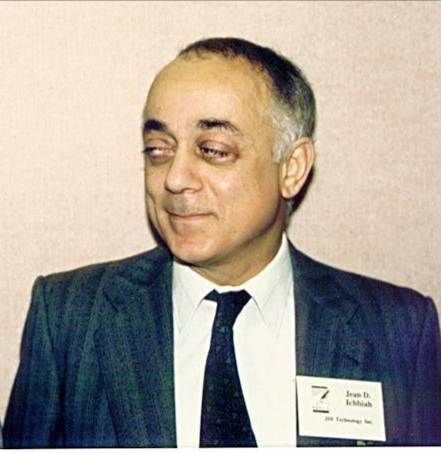This is the story of my life so far: 68 years and counting.
Prequel: A Brief History of my Family in France

The story starts here
Previous episode: Part 95
Jean Ichbiah
The original version of the Ada programming language has been created through an international competition sponsored by the US Department of Defense (DoD).
After a first phase in the competition, four teams of designers were selected to continue the competition, each given a color.
One of the four, the "Green team", was lead by Jean Ichbiah, a French computer scientist, working for CII Honeywell Bull.

Jean Ichbiah
The Green team won the competition and their language design is basically Ada 83.
Jean Ichbiah was very proud of Ada 83, his "baby", and thought that it was almost perfect.
The first reference manuals of Ada 83 were printed with a green cover.
Tucker Taft
Another of the four teams was the Red team, from the sotware company Intermetrics. One of the members of the Red team was Tucker Taft.
When the DoD decided to sponsor the next revision of the language, they selected a team from Intermetrics, lead by Tucker Taft, to be the designers of what was called initially Ada 9X, that eventually became Ada 95.

Tucker Taft
Jean Ichbiah was opposed to most of the changes in the language proposed by the design team of Ada 9X. And he was very vocal about it.
In particular, he hated the way object-oriented programming was to be introduced in Ada, through a new reserved word, "tagged", proposed by the design team.
A lot of time during the WG9 meetings was spent on the subject. So, the working group convener decided that during a meeting of the WG9 in Salem, Massachusetts, there will be a vote to decide once for all which of the proposal should be integrated in the language.
So, one morning, there was two presentations, each of an hour and a half, by Jean Ichbiah and Tucker Taft. The subject was not about object-oriented programming, but about new reserved words in the language.
After the presentations, there was a vote by the different country delegations: the question was:
- Should there be new reserved words instead of only new keywords, not reserved, in Ada 9X?
Answering "yes" was a vote for the design team led by Tucker, answering "no" was a vote for Jean's proposal.
Several of the delegations, including the US one, abstained.
The results of the vote was 3 "yes" and 2 "no". Of course, the French delegation voted "no".
However, immediately after the vote, several delegations that had abstained changed their votes to "yes", so that at the end there was a clear consensus for the design team.
The legend says that the Japanese delegation that had voted "yes" wanted to vote for Jean Ichbiah's proposal but had not realized that they should have voted "no".
Immediately after the vote, we broke for lunch. However, Jean Ichbiah told us that he was not going and that he will no longer be involved in Ada.
Losing such a brilliant language designer was a big loss for Ada, but without Jean's involvement, there would be less controversies.
Eventually, Ada 9X was standardized by ISO in 1995 and was known as Ada 95.
And the first printing of the reference manuals of Ada 95 had the title in red on the front cover.
Continue to Part 97
If you like this story, please consider to follow me
Summary
Part 1 - Part 2 - Part 3 - Part 4 - Part 5 - Part 6 - Part 7 - Part 8
Part 9 - Part 10 - Part 11 - Part 12 - Part 13 - Part 14 - Part 15 - Part 16
Part 17 - Part 18 - Part 19 - Part 20 - Part 21 - Part 22 - Part 23 - Part 24
Part 25 - Part 26 - Part 27 - Part 28 - Part 29 - Part 30 - Part 31 - Part 32
Part 33 - Part 34 - Part 35 - Part 36 - Part 37 - Part 38 - Part 39 - Part 40
Part 41 - Part 42 - Part 43 - Part 44 - Part 45 - Part 46 - Part 47 - Part 48
Part 49 - Part 50 - Part 51 - Part 52 - Part 53 - Part 54 - Part 55 - Part 56
Part 57 - Part 58 - Part 59 - Part 60 - Part 61 - Part 62 - Part 63 - Part 64
Part 65 - Part 66 - Part 67 - Part 68 - Part 69 - Part 70 - Part 71 - Part 72
Part 73 - Part 74 - Part 75 - Part 76 - Part 77 - Part 78 - Part 79 - Part 80
Part 81 - Part 82 - Part 83 - Part 84 - Part 85 - Part 86 - Part 87 - Part 88
Part 89 - Part 90 - Part 91 - Part 92 - Part 93 - Part 94 - Part 96

